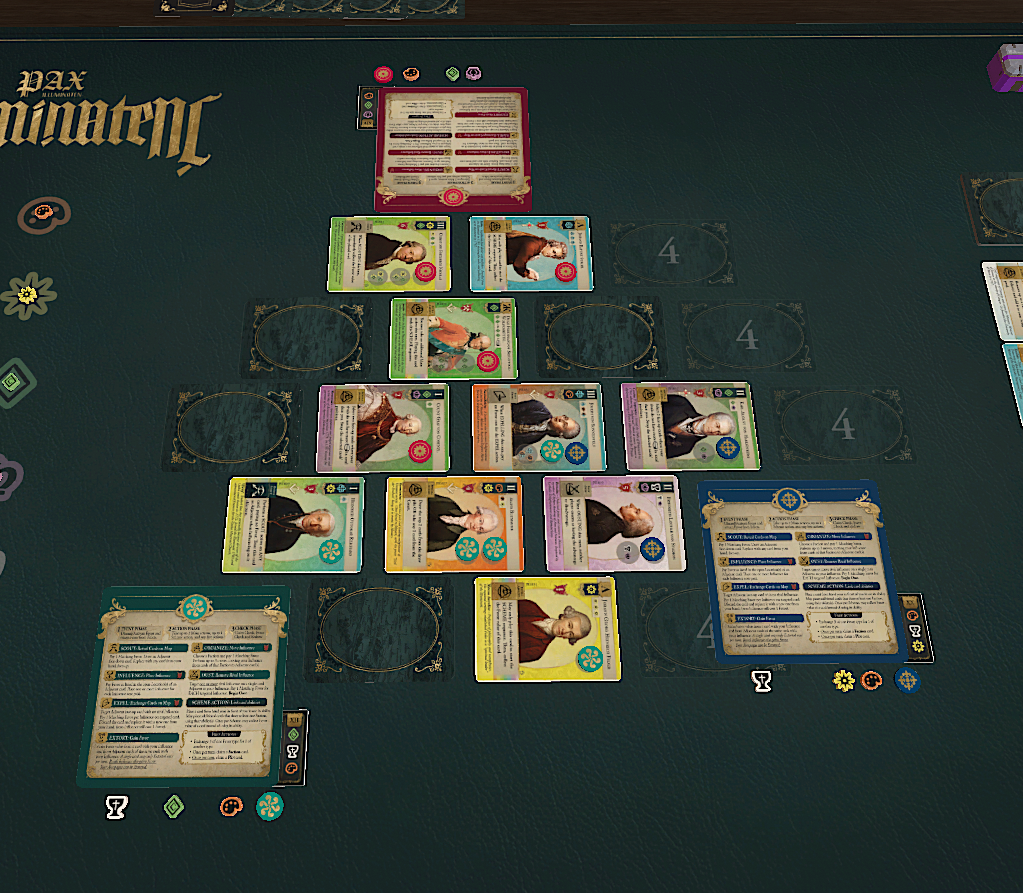by Oliver Kiley
( Pax Illuminaten on Tabletop Simulator)
It is interesting how we might begin a thing in one place, yet up someplace we never quite expected. Pax Illuminaten is one such journey, and one that started more than 10-years ago.
Back to the beginning: I’ve held a deep fascination for the Decket, a curious six-suited deck of double-suited cards. The Decktet was captivating as a game design tool and I was frequently experimenting with how one could adapt traditional card games, as well as other types of games, to use the system.
As fate would have it, a BGG design competition was launched with the following challenge: make an “express” version of a bigger game. Ha! Easy! Hegemonic, a space 4X game I designed, was recently published and I was struck by the idea of using cards - the Decktet cards specifically - to create a pint-sized 4X-like game. The idea being that in the anthropomorphic world of the Decktet, you as the player were sending off your political emissaries to form alliances with the various animal factions of the land.
The culmination of this was a game dubbed Emissary. It was one of those cases where the core pieces of the design just fell into place like they were destined to be. And so Emissary came to embody the basic cornerstones of 4X games: explore unknown territory, expand your sphere of influence, exploit resources, and use your assets to ‘exterminate’ or otherwise compete with your peers.
The game worked well, but I knew that if I wanted to publish it, I would need to do something more unique. And to be honest, I was growing disillusioned with the 4X genre, both in terms of what it dictated gameplay wise, the conventions players expected, and more importantly the thematic connotations. Ultimately, 4X games are games of colonization, and I wanted to move the design away from that.
Decoupled from the 4X theme, what did the underlying gameplay mechanics represent? What could they be potentially modeling or suggesting? I was sitting there with a very abstract system wondering how to connect it to something more tangible and interesting for people. And so for nearly ten years I tested out different iterations: space exploration, the terraforming of the planet mars, a woodland creatures theme. Nothing quite felt right.
One day, perusing my shelf of games, my gaze fell upon Steve Jackson’s Illuminati game. This game was one of the very first “hobby” games I ever purchased (back in the late 90s) and it still holds a place near and dear in my heart. But it got me thinking. The Illuminati. Everyone knows about the Illuminati and all the conspiracy theories. But what about the “real” Illuminati, or more specifically the Bavarian Illuminati?
Out of historical interest I started doing research on the Bavarian Illuminati. The more I read, the more interesting the story was to me. The conspiracy theories fell away, and what took their place was a story about Enlightenment era thinking being repressed on the cusp of both the French and American revolutions of the late 1700s. The Bavarian Illuminati “was” trying to change the world. But not to rule it as a tyrant. Instead, they were trying to put enlightenment thinking into practice, upheaving the rule of nobility and church to create a more liberal society! They kept their machinations within a secret society because in Bavaria it was quite literally against the law to spread certain enlightenment thoughts.
From here, I started connecting the dots. The very first theme for Emissary was about secret agents of a sort, and certainly the Illuminati were a society of secret agents! Could this be the theme I was searching for? Add to this that in the intervening 10-years a whole genre of “historically structured” games was burgeoning - chief among them the Pax games. Could Emissary become more Pax-like and be properly coupled to the story of the Bavarian Illuminati?
The more I dug into the history, the clearer the connection became between gameplay and narrative. Mechanics that I wanted to utilize for gameplay elements (like the event deck and end game triggers), suddenly had new thematic justification and were further enriched by it. At the kind and polite urgings of many playtestors, the game became even more Pax-like before my eyes.
And so naturally I asked: who publishes Pax-games? Well, ION Game Design does!
Fast-forward and I’m thrilled with the energy and passion ION has poured into my game. From gameplay development to art design, and everything in between, it has been awesome to work with ION and be part of the Pax-game legacy. I’m truly humbled - but also excited to see the game become even stronger.
